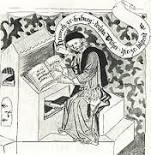Planning worship?
Check out our sister site, ZeteoSearch.org,
for 20+ additional resources related to your search.
- |
User Links
Person Results
Friderich Hommel
1813 - 1892 Person Name: Friedrich Hommel Composer of "[Ich weiß ein lieblich Engelspiel]" in Sonntagschulbuch
Friderich Hommel
Heinrich von Laufenberg

1390 - 1460 Author of "Ich weiss ein lieblich Engelspiel" in The Oxford Book of Carols Heinrich of Laufenburg was a native of Laufenburg, Aargau, Switzerland, The earliest notice of him is that in 1434 he was decan of the Collegiate Church of St. Maurice at Zofingen in Aargau. He afterwards held a similar post at Freiburg, in Baden; but in 1445 became a monk in the monastery of the Knights of St. John at Strassburg ("Zum grunen Werde"). He was living there in 1458, but probably died in that year or soon after (Koch, i. 213-214; Allgemine Deutsche Biographie, xix. 810-813, &c).
He was the most important and most prolific hymn-writer of the 15th century, and a number of his productions are of sweetness and abiding worth. Most of them are in honour of the Blessed Virgin Mary. Many are in intricate metres, while others are written to song tunes, or are recasts of songs, or translations from the Latin. A large number are included by Wackernagel in his second volume, principally taken from a paper manuscript of the 15th century, which he found in the town library at Strassburg.
Two of the best of his original hymns are:—
i. Ach lieber Herre Jesu Christ. Cradle Hymn. This beautiful prayer of a mother for her infant child is given by Wackernagel, ii. p. 534, in 5 stanza of 6 lines, from the Strassburg MS., where it is entitled "Benedictio puerily." In his Kleines Gesang-Buch, 1860, Wackernagel gives it as No. 114 (omitting stanza ii.) with the original melody, dating both 1429. The text is also in Hoffmann von Fallersleben, edition 1861, No. 125. Translated as:—
Ah ! Jesu Christ, my Lord most dear. A full and very good translation by Miss Winkworth in her ChristianSingers, &c, 1869, p. 93. The address to the B. V. M. in stanza ii.,
"Maria, müter Jesu Christ,
Sit du dins Kints gewaltig bist,"
is translated as:—
“Since in Thy heavenly kingdom, Lord,
All things obey Thy lightest word."
Her translation was adopted with alterations by the Rev. H. White in the Savoy Hymnary (Chapel Royal, Savoy), 1870, No. 35, beginning, "Lord Jesu Christ, our Lord most dear." Instead of taking the very good original melody, Mr. White altered the hymn to 6-8 metre, and omitted stanzas iv., v. This form has been repeated in the S. P. C. K. Church Hymns, 1871; Mrs. Brock's Children's Hymn Book, 1881, and others.
ii. Ich wollt dass ich daheime war. Eternal Life. A beautiful hymn of spiritual Home¬sickness. Wackernagel, ii. p. 540, includes a version in 13 stanzas of 2 lines from the Strassburg MS.; and another in 9 stanzas of 2 lines from a 15th century MS. at Berlin. Hoffmann von Fallersleben, 1861, gives the Strassburg text as No. 54; and a form in 9 stanzas from a MS. at Inzkofen, near Sigmaringen, dating 1470-1480, as No. 55. In his Kleines Gesang-Buch,1860, Wackernagel gives as No. 74 a slightly altered form of the Strassburg text, along with the original melody. Translated as "I would I were at last at home," by Miss Winkworth, 1869, p. 92. [Rev. James Mearns, M.A.]
-- John Julian, Dictionary of Hymnology
Heinrich von Laufenberg


 My Starred Hymns
My Starred Hymns


